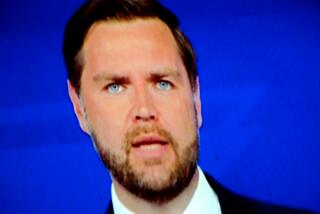Democrats Euphoric Over Perceived Victory in Debate : Dukakis Makes Quayle His Target at Rally in Texas
- Share via
LONE STAR, Tex. — With a steel plant at his back and his running mate at his side, Michael S. Dukakis came to Texas Thursday to hunt Quayle.
The Democratic presidential nominee, running mate Lloyd Bentsen and their staffs appeared euphoric over Wednesday night’s debate between Bentsen and Republican vice presidential nominee Dan Quayle.
“After listening to Dan Quayle for 90 minutes last night, I could understand why he kept talking about job training,” Bentsen joked.
Changes Focus of Remarks
Dukakis, setting aside a planned speech on economic competitiveness, concentrated his remarks to the cheering crowd on telling voters that they should judge a candidate by whom he chooses as a running mate.
“You’ve got to choose somebody who’s ready to step into that Oval Office on a moment’s notice and knows what he’s going to do when he gets there,” he said.
The Dukakis campaign amplified that reference to Quayle’s biggest debate problem by giving reporters transcripts of the four times Quayle was asked what he would do if he suddenly were thrust into the presidency.
Even the campaign’s musical accompaniment was directed against Quayle. Rather than his usual introductory song, Neil Diamond’s “America,” Dukakis strode into his rally here with a grin as loudspeakers blared Creedence Clearwater Revival’s Vietnam War-era song “Fortunate Son.”
“They sent me down to war . . . I ain’t a millionaire’s son . . . It ain’t me, it ain’t me, I ain’t the fortunate one,” the lyrics said.
Music Lost on Audience
The music was badly timed to Dukakis’ entrance and seemed somewhat lost on the crowd, which at this event in the middle of a working day appeared mostly to be over 60 or under 16. But the attack message got through to the principal target audience--reporters covering the campaign.
For Dukakis, Lone Star provided several symbolic hooks. The area’s largest employer, the Lone Star Steel plant, suffered severe layoffs several years ago because of foreign competition. It then reopened after special legislation authorized federal help. Dukakis has been talking about trade and foreign competition more often as he seeks to strike a more populist note in his campaign.
In addition, the area’s congressman, Jim Chapman, first entered the House after a hotly fought special election in 1985. He won largely by stressing the trade issue, and the victory presaged the Democrats’ Southern Senate victories in 1986. Finally, East Texas remains a key battleground between Dukakis and Bush for the November election.
Bush is almost certain to win West Texas and the heavily populated Dallas suburbs. Dukakis, to win the state, must run up a large majority in heavily Latino South Texas, do well in Houston and hold on to traditionally Democratic, but conservative, voters here amid the piney woods of the eastern part of the state.
So far, he is running behind in the state, but some new polls show the gap closing, the campaign’s state director, Tom Cosgrove, said. A Mason-Dixon Research survey of about 800 Texas voters done before the debate showed Bush with a five-point lead, about half the size of the GOP margin in polls several weeks ago.
Dukakis and his aides hope the vice presidential debate will close that gap further.
“I’ve never seen Quayle up close like that, and I thought it was very disturbing,” Dukakis told reporters on his plane as he flew here from Boston. Quayle, he said, seemed “programmed beyond belief” and “extremely insecure.”
“He didn’t have a sense of strength or control or anything,” he said. Having Quayle “a heartbeat away from the presidency,” he said, would be “very, very troubling.”
Dukakis added: “Judge us by the way we made it and who we chose. Ask yourself which one of us fulfilled our presidential obligation.”
“Strong presidents look for strong vice presidents. Weak candidates look for something else.”
When flying to Texas from Omaha early Thursday, Bentsen told reporters that he and his wife and family prayed in their hotel room before entering the debate hall.
“I knew a lot of pressure was on me,” he said. “The expectations were very high.”
Bentsen insisted that his heated response to Quayle, “Senator, you are no Jack Kennedy,” was not a pretested, prescripted line.
“I was very angry to hear all this stuff, that it was a preplanned response,” he said. “That is absolutely untrue. I was angry. He was, frankly, overreaching. He was trying to assume Jack Kennedy’s mantle.”
Bentsen said he was “delighted” with polls showing he had bested Quayle in the debate and helped the Democratic ticket. “It’s very difficult to be objective about yourself,” he said. “To come out and say, ‘I was great, I was fantastic,’ that’s not me.”
When asked how he would have responded to the repeated questions to Quayle about what he would do if he suddenly became President, Bentsen had a detailed answer.
He said he would first meet the National Security Council, the Joint Chiefs of Staff and the head of the CIA to ensure military security. Next, he said, he would call Soviet leader Mikhail S. Gorbachev “and tell him we’d had a transfer of power and everything was in order . . . .” Then, he said, he would call a Cabinet meeting, meet with congressional leaders and go before the American people on TV to reassure the nation.
“And I’d do all that in my first 12 hours,” Bentsen added.
Bentsen denied Republican charges that he had avoided defending Dukakis. “I came to his defense many, many times,” he said. “I talked about how proud I was to be on the ticket with him.”
More to Read
Get the L.A. Times Politics newsletter
Deeply reported insights into legislation, politics and policy from Sacramento, Washington and beyond. In your inbox twice per week.
You may occasionally receive promotional content from the Los Angeles Times.












